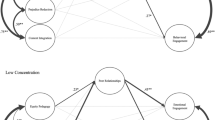Abstract
Although students from diverse backgrounds may have access to equal educational opportunity by occupying the same classroom space, they do not necessarily enjoy equal and fair access to the same quality of experience within that classroom. The inequalities and inequities are partially a result of privilege, an advantage afforded to individuals because of their similarity to the norms operating in the classroom. In this article, the ways in which the white male students in a diverse, urban fourth grade classroom exercise privilege are identified and the white teacher's approach to mediating white male privilege, equality, and equity is examined. The teacher's approach is evaluated in terms of fairness via the white male students' perceptions of the classroom environment, viewed in relation to power and caring and is discussed with respect to implications for teacher preparation.
Similar content being viewed by others
REFERENCES
Alvermann, D. E., Dillon, D. R. & O'Brien, D. G. (1987). Using discussion to promote reading comprehension. Newark, DE: International Reading Association.
American Association of University Women (1992). How schools shortchange girls: A study of major findings on girls and education. Washington, DC.
Becker, J. R. (1981). Differential treatment of females and males in mathematics classes. Journal for Research in Mathematics Education, 12, 40-53.
Buber, M. (1965). Education. In M. Buber (Ed.), Between man and man (pp. 83-103). New York: Macmillan.
Denzin, N. (1978). The research act: A theoretical introductionto sociological methods. New York: McGraw-Hill.
Ferguson, R. (1990). Introduction: Invisible center. In R. Ferguson, M. Gever, T. Minh-ha, & C. West (Eds.) Out there: Marginalization and contemporary cultures (pp. 9-14). Cambridge, Massachusetts: MIT Press.
Fine, M. (1996). Witnessing whiteness. In M. Fine, L. Powell, & L. Weis (Eds.), Off-white: Readings on race, power and society. New York: Routledge.
Fraser, B. (1994). Research on classroom and school climate. In D. Gabel (Ed.), Handbook of research on science teaching and learning (pp. 493-541). New York: Macmillian.
Good, R., Sikes, J. N. & Brophy, J. E. (1973). Effects of teacher sex on classroom interaction. Journal of Educational Psychology, 65, 74-87.
Guba, E. (1990). The paradigm dialog. Newbury Park: Sage.
Guba, E. and Lincoln, Y. (1989). Fourth generation evaluation. Newbury Park: Sage.
Hindess, B. (1996). Discourses of Power: From Hobbes to Foucault. Massachusetts: Blackwell Publishers, Inc.
Jones, M. G. & Wheatley, J. (1990). Gender differences in teacher-student interactions in science classrooms. Journal of Research in Science Teaching, 27, 861-874.
Lemke, J. (1990). Talking science: Language, learning and values. Norwood, New Jersey: Ablex.
McIntosh, P. (1993). Examining unearned privilege. Liberal Education, 79(1), 61-63.
McIntosh, P. (1995). White privilege and male privilege: A personal account of coming to see correspondences through work in Women's Studies. In K. Rousmaniere (Ed.), Readings in sociocultural studies in education (2nd ed.). New York: McGraw Hill.
McIntyre, A. (1997). Making meaning of whiteness: Exploring racial identity with white teachers. Albany, New York: SUNY Press.
McLaren, P. (1997). Decentering whiteness: In search of a revolutionary multiculturalism. Multicultural Education 5 1.
Morse, L. W. & Handley, H. M. (1985). Listening to adolescents: Gender differences in science classroom interaction. In L. C. Wilkinson & C. B. Marrett (Eds.), Gender influences in classroom interaction (pp. 37-56). New York: Academic Press.
Noblit, G. (1993). Power and caring. American Educational Research Journal, 30(1), 23-38.
Noddings, N. (1992). The challenge to care in schools: An alternative approach to education. New York: Teachers College Press.
Richmond, V.P. and McCroskey, J.C. (1992). Power in the classroom: Communication, control, and concern. New Jersey: Lawrence Erlbaum Associates.
Sadker, M. & Sadker, D. (1985a). Effectiveness and equity in college teaching: Final report. Washington, D.C.: Fund for the improvement of post-secondary education.
Sadker, M. & Sadker, D. (1985b). Is the O.K. classroom O.K.? Phi Delta Kappan, 66, 358-361.
Sadker, M. & Sadker, D. (1985c). Sexism in the schoolroom of the 80s. Psychology Today, March 54-57.
Sadker, M. & Sadker, D. (1986). Sexism in the classroom: From grade school to graduate school. Phi Delta Kappan, 67(7), 512-515.
Sadker, M. & Sadker, D. (1987). The intellectual exchange-Excellence and equity in college teaching. Kansas City, MO: The Mid-Continent Regional Laboratory.
Tesch, R. (1990). Qualitative research: Analysis of types and software tools. New York: Farmer Press.
Tobin, K. & Garnett, P. (1987). Gender related differences in science activities. Science Education, 71(1), 91-103.
Author information
Authors and Affiliations
Rights and permissions
About this article
Cite this article
Parsons, E.C. Using Power and Caring to Mediate White Male Privilege, Equality, and Equity in an Urban Elementary Classroom: Implications for Teacher Preparation. The Urban Review 33, 321–338 (2001). https://doi.org/10.1023/A:1012296330048
Issue Date:
DOI: https://doi.org/10.1023/A:1012296330048




